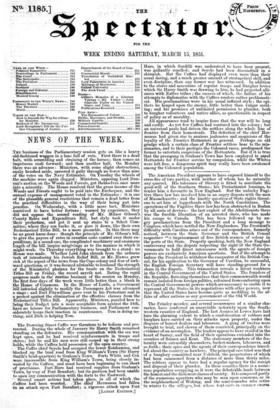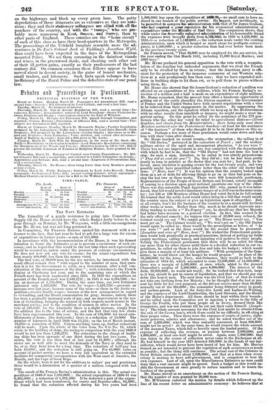The Frimley murder; and several occurrences of a similar cha-
racter, have conferred an unenviable notoriety upon the South- western counties of England. The last Assizes at Lewes have laid bare the alarming extent to which a confederation of robbers and burglars have carried on their attacks upon property, under the disguise of honest dealers and labourers. A gang of twelve were brought to trial, and eleven of them convicted, principally on the evidence of an accomplice. The leaders appear to have resided in the heart of Surrey, and the field of their operations extended into the counties of Sussex and Kent. The stationary members of the fra- ternity were ostensibly shoemakers, basket-makers, labourers, and so forth ; their spies and the agents of their correspondence travel- led about the country as hawkers. The principal case tried was that of a burglary committed near Uckfiol , the perpetrators of which had been summoned from a distance of more than thirty miles. The robbers appear to have had a regular agency for the receipt and disposal of their plunder. In these counties there is a nume- rous population occupying as it were the debatiable lands between the honest and the dishonest classes of society. It is composed partly of the numerous squatters who may be seen upon commons, as in the neighbourhood of Woking, and the somi-nomades who retire in winter to the vilLiges, but whose tent-carts in sumnnr swarm
on the highways and block up every green lane. The petty depredations of these itinerants are as extensive as they are noto- rious; they and their stationary colleagues are allied with all the poachers of the country, and with the " tramps," who are Fo- bably more numerous in Kent, Sussex, and Surrey, than in otherof England. These counties are the "home circuit" of suct)aorls this class as have their head-quarters in the Metropolis. The proceedings of the T.Tckfield burglars resemble more the ad- ventures in De Foe's Colonel Jack or Fielding's Jonathan Wyld, than could have been expected in. the days of the Metropolitan mounted Police. We see them carousing on the daintiest viands and wines, in the greenwood shade, and cheating each other out of their ill gotten gains, exactly as their predecessors of the last century did. On common occasions these fellows appear to have moved about in decent society, in the guise of honest mechanics, small traders, and labourers. Such facts speak volumes for the inefficiency of the Rural Police and the defective state of our penal
law.



























